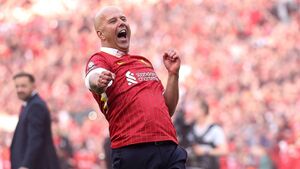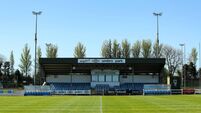Why fitting in has been no bother to Slot

Arne Slot, manger of Liverpool, celebrates the team's victory and confirmation of winning the Premier League title after the match against Tottenham Hotspur at Anfield on April 27. Picture: Carl Recine/Getty Images
“A lot of football success is in the mind,” Bill Shankly once said, when speaking about his time as Liverpool manager as the club started to establish itself as a powerhouse in the 1960s.
“You must believe that you are the best and then make sure that you are, in my time at Liverpool we always said we had the best two teams in Merseyside, Liverpool and Liverpool reserves.”
Shankly is a revered figure around Anfield, where his memory is immortalised in the form of a statue outside the ground. It's unlikely that Liverpool's current incumbent will ever see himself in bronze on the outskirts of the famous old stadium, but it's easy to draw parallels with Arne Slot and Shankly.
The Dutch boss has done a marvellous job with Liverpool and his appointment to the role is reminiscent of a by-gone era where the boot-room culture was one of the unique factors that separated Liverpool from the rest.
The famous old phrase – which referred to a literal boot room in the depths of Anfield where coaching staff would gather to discuss plans for the team – is often used to help underline the succession planning that took place when it came to management of the football club.
Shankly was the first to use the boot room and, ironically, of the members of his coaching team, Bob Paisley, Joe Fagan and Ronnie Moran all went on to manage the club at one stage or another. Roy Evans and Kenny Dalglish also used the room in their time before it was demolished in the early 1990s when another club legend, Graeme Souness, was in the dugout.
Culture matters in sport, and Liverpool have managed to maintain theirs over a long number of years.
Slot and Jurgen Klopp may never have shared a room discussing tactics, but they do share similar values. And that has been evident in this season's success – Slot may have been the man in charge for the full season, but some of the foundation was already in place when Klopp departed this time last year.
The smooth transition from Klopp to Slot is one of Liverpool's greatest achievements in the modern era.
While his tenure of nine years was much shorter than that of Arsene Wenger at Arsenal (22 years) or Alex Ferguson at Manchester United (27 years), Klopp's impact at the club was every bit as significant. Guiding Liverpool to the league title in 2020, after 30 years of failure in the Premier League, was a monumental achievement. So too was the Champions League triumph in 2019.
Through those successes, Klopp helped re-establish Liverpool's old confidence. Anfield, once a ground feared by opposition of all hues, became a place where visiting fans felt results were possible. Under Klopp, Liverpool went 68 league matches unbeaten in the Premier League between April 2017 and January 2021. That's a turnaround.
Fans' belief that Liverpool would return to the top of the tree at some point was certainly tested by their barren spell in the English game, but Klopp helped restore the confidence that Shankly once spoke about in generations past. On that rock-solid foundation, Liverpool progressed to become far more consistent.
As has become all too obvious for fans of Manchester United and, to a lesser extent Arsenal, the departure of a totemic figure can have a devastating impact. No one wants to be the guy to succeed the person viewed as the be-all and end-all – just ask Unai Emery and David Moyes, who both had torrid experiences in trying to succeed in the aftermath of their predecessors. They aren't bad managers, as proved by their success at other clubs, but the timing was off when they took the biggest jobs of their careers.
How has Slot managed it?
His understated nature is helpful, and he's a composed, thoughtful figure. Watching his press conferences shows just that: he's firm and confident in his delivery without being brash or over-bearing. He doesn't take a backwards step on the sideline either, while he has managed what has been a delicate situation around the contracts of key players all throughout the season.
Most of all, Slot has resisted the urge to place a major personal stamp on the team. He has helped the side evolve in subtle ways – for example, their approach to pressing high up the park is slightly more relaxed – but by and large, he has kept faith with what Klopp had established. And with that approach, Liverpool have succeeded.
Detractors will point to the fact that Liverpool's Champions League efforts faltered rather meekly against PSG, while there was a League Cup final loss to Newcastle United which came after a display that was among the worst Slot's side has produced this season. There was also a FA Cup exit at the hands of lowly Plymouth Argyle.
But, for all that, one cannot argue that the Premier League title is the one that carries the most weight for a club of Liverpool's stature. The importance attached to a Premier League triumph is only heightened with the situation they have found themselves in having dominated for so long in past generations, before their run of 30 years without a title until 2020. It's crazy to suggest, in that context, that Liverpool have underachieved this season.
To build a legacy like Shankly, or to eclipse the one league title claimed by Klopp, Arne Slot will need to be smart in the transfer market and strengthen his squad this summer. For now, though, the Dutchman can pause and reflect on a job well done in his first season in the hotseat.





